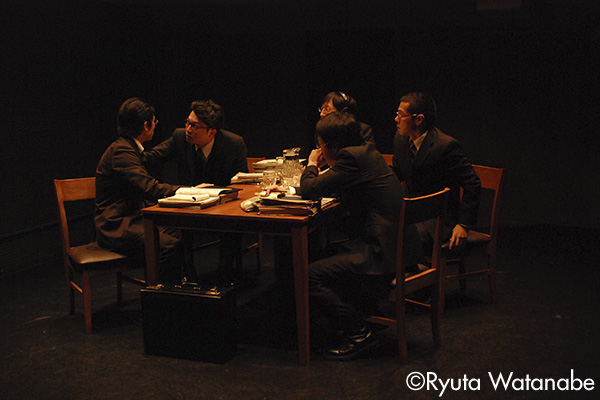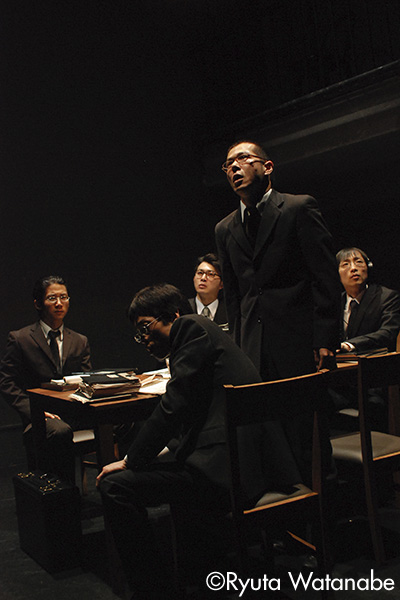Five men appear on a stage set with only tables and chairs. They are the leader of the defense, Uzawa, and his team of four lawyers. Hoshinomiya wearing the headphones also serves as the team’s interpreter. The remaining three are Mizukoshi, who is the somewhat weak-willed in appearance, Yanase, who quietly watches all the proceedings with an observant eye, and the apparently aggressive Suenaga.
The judge-in-chief of the tribunal and the prosecutors enter the courtroom and the commencement of proceedings is announced. (Of course, these events are only indicated by the reactions of the defense team. And after this, all of the statements and actions coming from the judges and prosecutors are communicated to the audience solely through the reactions and conversation of the Japanese defense team, and there is no audible voicing of the statements of the judges and prosecutors whatsoever.) After the two days of reading the indictments against the accused, the actual trial begins with the 28 defendants stating their pleas of guilty or not guilty.
The first job for the defense team is presenting their objections to the contents of the indictments brought against the defendants. They point out mistakes in the translations of the indictments and their strategy is to demand that the statement of pleas be postponed until these mistakes are corrected. However, the chief prosecutor, Joseph Keenan, rejects this appeal based on the fact that the Japanese translation is no more than an accompanying document of convenience to the original English indictments. When Suenaga immediately attacks that response, it appears that the trial will be a contentious one from the beginning.
The defense’s next move is a motion challenging the validity of one of the judges. The claim is that the Judge-in-Chief, William Webb of Australia, had already filed a suit in Australia against the Japanese military concerning war atrocities, which violates the rule that the same justice cannot try defendants for the same case twice. This point is taken into consideration and a 15-minute break is called to deliberate on it.
During this break, the five lawyers discuss their strategy. They are encouraged by the fact that this technicality has caused a deliberation and decide to continue fighting in Suenaga’s style of blocking the prosecution’s statements with debate. However, only the five judges from France, the Netherlands, Canada, New Zealand and India return to the courtroom after the break and they inform the defense that their challenge has been rejected. The essence of the judges’ answer is that the tribunal appointments made by McArthur will remain firm. However, concerning the reason that only five of the judges have returned to the courtroom, the interpretations of the five defense lawyers differ.
The plea-making begins. The defense will not have a case to argue if any of the 28 defendants pleads guilty to the charges against them. And Mizukoshi is worried that his father (the former Foreign Minister Hirota and one of the defendants) might be willing to plead guilty, considering his responsibility and guilt as one of the people who led the country. Although their names are different, Mizukoshi is in fact the son of the former Foreign Minister.
However, the plea-making is completed with no problems, as all plead innocent. Now Uzawa is ready for his next motion, which is to point out the difference between this trial and the Nuremberg Trials where the war criminals of Japan’s defeated ally, Germany, were tried. To this end, the five lawyers for the defense use every means they can to get the prosecutors to say that this trial is the same as Nuremberg, so that they can then present the argument that the two trials are in fact different because Germany had made an unconditional surrender, whereas Japan had surrendered under the conditions of the Potsdam Declaration. Based on this argument they intend to appeal that the Japanese leaders cannot be tried on the same counts as the Nazi leaders at Nuremberg.
The debate heats up and emotional words are exchanged. In the words of the lawyers we begin to get glimpses of the crosses they each bear as individuals.
In order to win a verdict of innocent, the defense team raises the possibility of the right of reprisal. The idea is that Japan has the right of reprisal against the US for dropping the two atomic bombs on Japan. The chief prosecutor states that the atomic bombings were essential to end the war and counters by saying that if the defense talks about right of reprisal does it mean that if Japan had the atomic bomb they would have dropped it in reprisal? Hearing this, Yanase suddenly ends his silence and stands up in protest. He was one of the survivors of the Hiroshima atomic bombing. “We would never engage in such reprisal or revenge. As citizens of the only country ever to suffer an atomic bombing, we could never do what you did.” Each of Yanase’s words is weighted with emotion and strong intent. But after Yanase is finished, the only response the defense team receives from the Judge-in-Chief is a brief answer that the court rejects all motions, requests and statements concerning the matter.
Once again the five lawyers are confronted with the merciless unfairness of victors passing judgment on the defeated. But Uzawa won’t give up. He directs his four team members to review the contents of the case once again.
Keenan begins his opening statement by saying that the 28 men in the defendants’ dock had declared war on civilization. Hearing these words, Suenaga immediately stands up and makes an objection. This marked the start of a long trial that would last for two and a half years. The true battle is just beginning.




